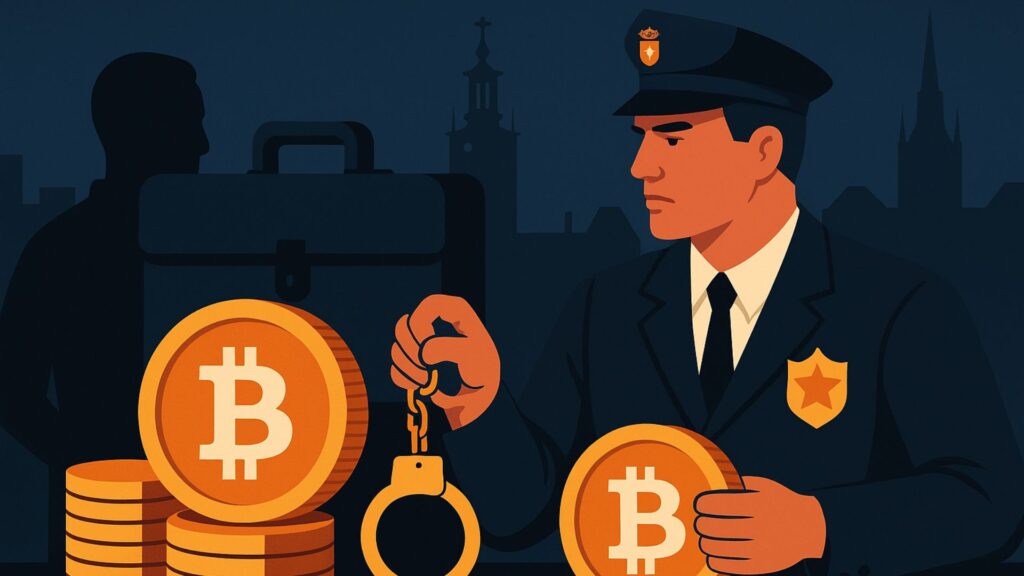Sweden is tightening the screws on crypto-related crime. With a new seizure law now in place and a detailed crypto tax framework incoming, authorities are making it clear that digital assets are no longer out of reach.
While the country has maintained a cautious yet open approach to crypto, the government is now sending stronger signals, especially when it comes to criminal activity and tax evasion.
From stricter reporting requirements to a more aggressive stance on asset confiscation, here’s how Sweden is redefining its crypto policy through regulation and enforcement.
Sweden’s Evolving Legal and Regulatory Approach to Crypto
Sweden does not recognise crypto as legal tender, so it cannot be used to settle debts or pay taxes. However, individuals and businesses are free to own, trade, and hold crypto assets, which are treated as legal investments.
These assets fall under financial regulations, and exchanges operating in Sweden must comply with anti-money laundering and counter-terrorism financing laws enforced by the Financial Supervisory Authority (Finansinspektionen, FI).
Crypto firms are required to register with FI, and from 2024, they must also align with the EU’s Markets in Crypto-Assets Regulation (MiCA).
On the tax front, profits from crypto sales are subject to a capital gains tax of 30% for individuals, with higher rates for businesses.
Crypto mining, particularly Bitcoin mining, is not popular in Sweden due to high electricity costs and carbon taxes. In fact, the country previously proposed an EU-wide ban on proof-of-work mining over environmental concerns, though this is yet to be implemented.
The Swedish government maintains a sceptical stance towards decentralisation. Authorities frequently cite concerns about fraud and tax evasion tied to crypto use.
That said, Sweden is also pushing forward with its central bank digital currency, the e-krona, which reflects a preference for state-controlled digital innovation.
Recent efforts have focused heavily on cracking down on illicit crypto use, particularly in criminal cases involving drugs or ransomware.
Institutional adoption remains cautious. Some banks, such as SEB, offer limited crypto exposure for institutional clients but tend to restrict access for retail traders.
A handful of businesses accept crypto, though overall adoption is limited due to volatility and lack of regulatory clarity.
Public sentiment reflects similar caution, with surveys showing most Swedes prefer traditional investments, even as younger people begin to show growing interest in digital assets.
The Justice Ministry’s New Focus: Crypto and Crime
Sweden’s Justice Minister, Gunnar Strömmer, recently revealed that over $8.3 million in criminal assets have been seized since a major law reform came into effect in November 2024.
This reform gives authorities expanded powers to seize assets without needing a conviction, allowing them to confiscate luxury goods, cash, and crypto from suspected criminals, even before formal investigations conclude.
Strömmer is urging a coordinated approach. Police, tax agencies, and courts have been told to focus especially on high-value assets including digital currency, real estate, and business holdings.
Crypto has emerged as a clear area of focus. Its ease of use and relative anonymity made it attractive to criminals, but new rules are beginning to shift the balance.
Although the government has not specified exactly how much of the $8.3 million haul was in crypto, it is evident that digital assets are now firmly within the sights of law enforcement.
This move is part of a broader effort to disrupt the financial infrastructure of organised crime. The message is simple: criminal profit, whether physical or digital, will not be safe.
The use of crypto is no longer a guaranteed shield for those trying to stay hidden. The government is now treating digital wallets much like bank accounts or luxury cars—assets that can be taken if linked to illicit activity.
In addition to seizures, Sweden is preparing to tighten tax regulations for crypto holders. A new draft bill, set to take effect from January 1, 2026, will make it significantly harder for individuals to avoid declaring crypto gains.
Under the proposal, crypto platforms operating in Sweden will be required to report all user transactions directly to authorities.
The new measures are based on the Crypto-Asset Reporting Framework (CARF) and the Automatic Exchange of Information (AEOI) rules. These global standards are designed to improve tax transparency and prevent cross-border evasion.
Sweden is also implementing the EU’s DAC8 directive, which will ensure that crypto transaction data is automatically shared between countries to expose offshore holdings.
Platforms will be required to report not only traditional cryptocurrencies, but also tokens linked to commodities or securities. Non-compliance will carry financial penalties, with fines ranging from SEK 2,500 to SEK 5,000 (roughly $260 to $520) per reporting failure.
These changes will have a direct impact on anyone trading on Swedish or EU-based platforms. Privacy will shrink, and paperwork will increase.
More importantly, tax authorities will have automatic access to crypto transaction histories, leaving little room to conceal profits. Sweden is not acting alone in this.
The global trend is shifting towards increased cooperation and shared enforcement to close the gaps that once made crypto a tax loophole.
Conclusion
Sweden’s approach to crypto is changing fast. The balance is tilting from cautious acceptance towards tighter control, particularly around criminal activity and taxation.
With the new seizure law and the incoming tax regulations, crypto users in Sweden are being placed under closer scrutiny. While digital assets remain legal to hold and trade, the space is becoming far more regulated.
The rise of the e-krona also shows that Sweden’s priority is a controlled digital future, with less room for decentralised finance.
Editor: Lydicius

